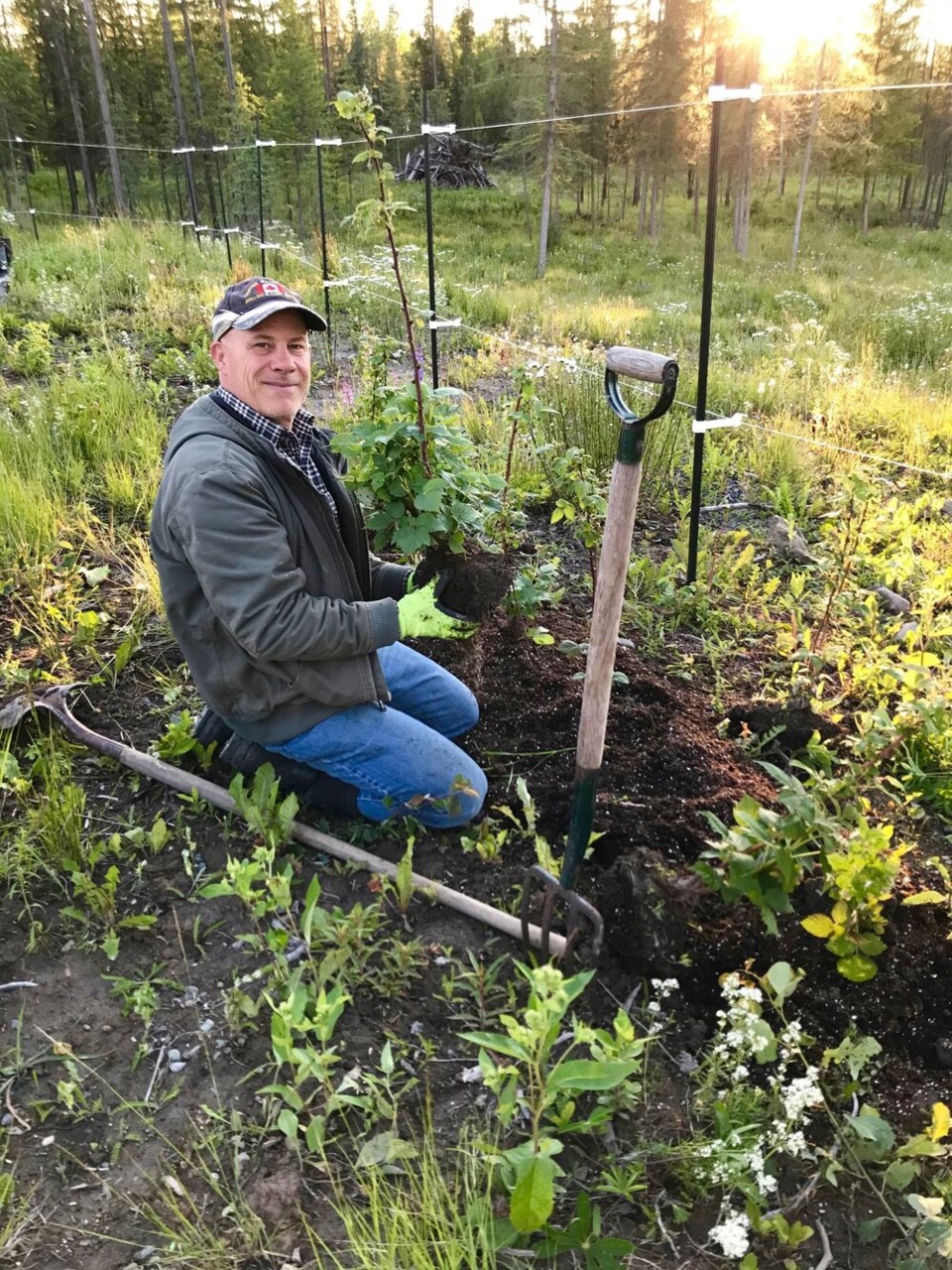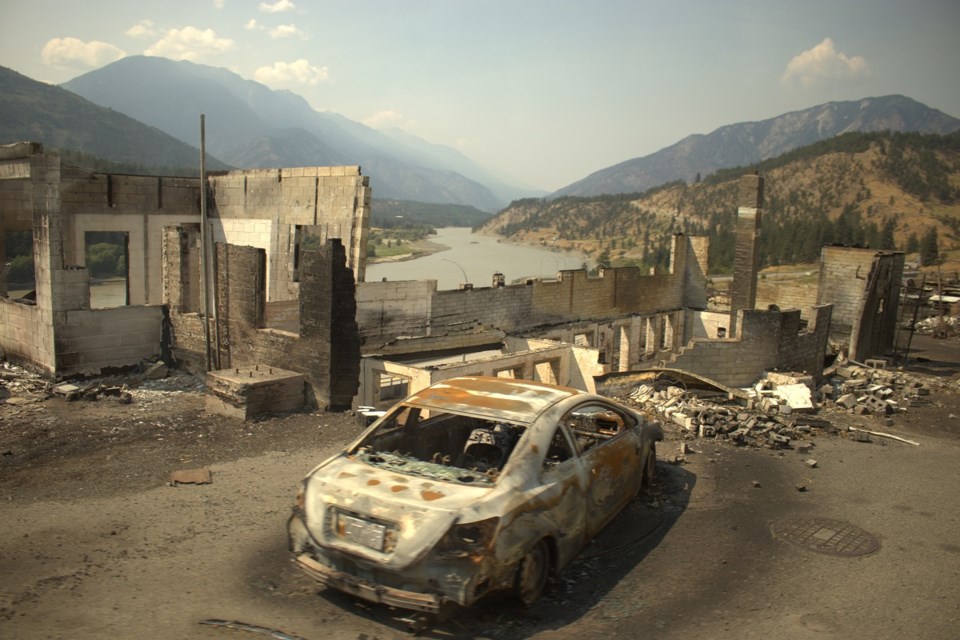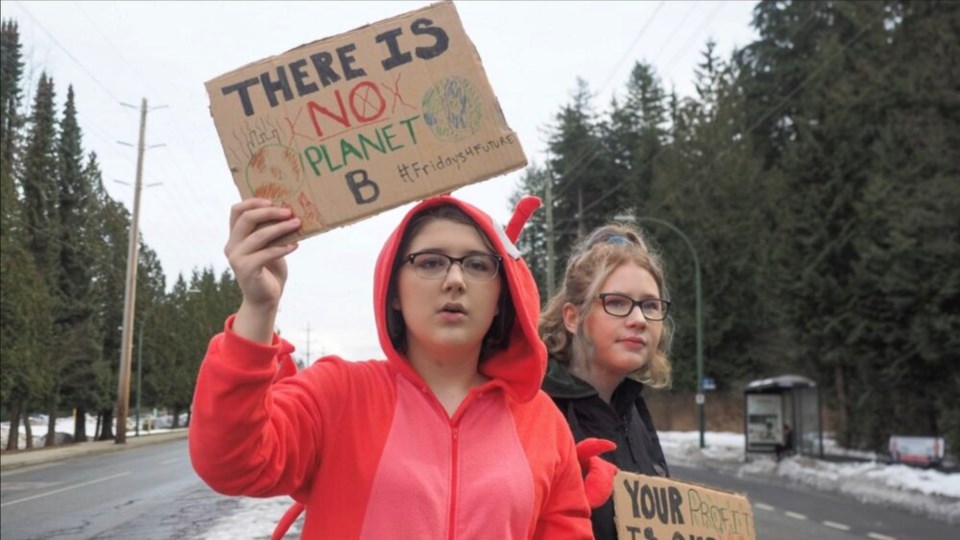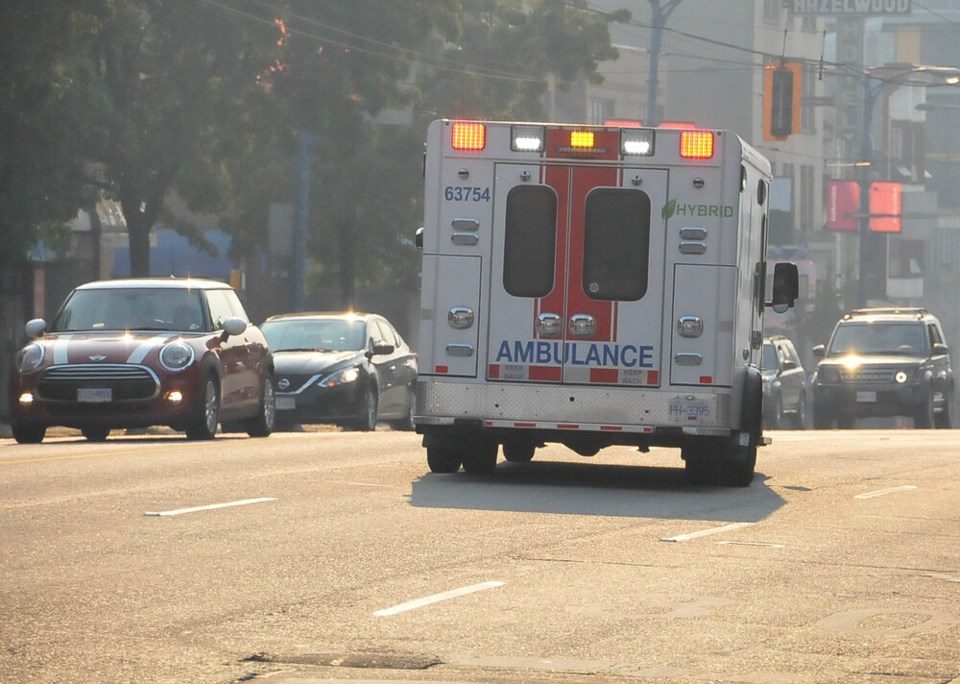Salmon Arm had been blanketed in wildfire smoke for days. A record heat dome had killed nearly 600 people across the province only weeks earlier.
When the town of Lytton, B.C., set a Canadian temperature record of 49.6 C — a day later burning to the ground — the evacuees added to the steady stream of patients at the Shuswap Lake General Hospital.
Emergency room doctor Lori Adamson remembers stretchers lined up in the hallway. The number of patients suffering heat illness and smoke inhalation meant her unit was running out of available beds and nurses.
Then came the suicides.
“A lot of the youth that I was seeing were attempting to commit suicide because of climate distress,” she told Glacier Media.
“They're fearing that they'll never outlive the climate disasters and global warming… they overtly expressed that.”
Adamson says at least three young patients she saw tried to end their life through a drug overdose because they feared climate change. Some were transferred to hospitals that could provide higher levels of care.
The doctor does not know how or if all the patients survived.
There is emerging evidence that government inaction on climate change is impacting young people's health in severe ways. Last September, a of 10,000 young people across 10 countries found nearly half of those between 16 and 25 reported psychological distress over climate change.
In some of the most telling signs, 58 per cent of respondents said governments were betraying future generations; 75 per cent said “the future was frightening.”
‘IT PROVOKES A SPIRAL’
In recent years, suicide rates in British Columbia have steadily declined from a peak in 2014. But the provincial numbers hide some important regional differences. As of 2018, B.C.’s Interior Health Authority recorded the highest rate of suicide deaths, with the Northern Health Authority following close behind.
How the fallout from climate change will affect those numbers is less clear. Experts are just starting to probe the links between climate change and mental health. After a year in which a series of extreme weather events devastated British Columbia, that work has already uncovered some important trends.
One released in January 2022 found the heat dome that scorched British Columbia in late June led to a 13 per cent average rise in anxiety over the effects of climate change. The study did not, however, probe the effects of climate change on suicide rates.
Study co-author Kiffer Card said he is not surprised climate anxiety is pushing people toward taking their own life.
“One of the main features of suicide is a sense of hopelessness,” said the epidemiologist, who studies the effects of climate change on mental health at Simon Fraser University. “Certainly, weather and worries about the future can give that extra push to end your life.”
Suicidal thoughts are rarely the result of one factor. Card says the combined effects of the ongoing opioid crisis or a lack of cognitive capacity and controls in some people are among a long list of factors that can trigger a mental health crisis.
Some people look at the world around them and tell themselves, “Climate change is here. It’s burning down my neighbourhood. Where is my future?” said Card.
“It provokes a spiral.”
CANADA IN THE CROSSHAIRS FOR CLIMATE DISTRESS
To date, there has been little research looking at how climate change is going to impact suicide rates in Canada. But that’s changing.
“We know that eco-anxiety is a real thing — that is absolutely diagnosable — and that depression is also linked to people's feelings of helplessness,” said Tim Takaro, a medical doctor and scientist studying the health impacts of climate change.
“What I don't know is how many people with climate-related depression are going to take their lives.”
A report Takaro co-authored earlier this year looking at the health impacts of climate change in Canada found that in 15 previous studies, suicides rates went up with high ambient temperatures.
Studies in other jurisdictions measuring the effects of a warming world on suicide rates paint a grim picture.
In 2020, a group of researchers — including University of British Columbia environmental economics researcher Patrick Baylis — examined the link between suicide rates and temperature data across the U.S. and Mexico. The long-term historical data suggested that for every one degree Celsius increase in monthly average temperature, suicide rates climbed 0.7 per cent in U.S. counties and 2.1 per cent in Mexican municipalities.
By 2050, the researchers found global temperature rise could lead to between 9,000 and 40,000 additional suicides between the two countries. That’s a change in suicide rates comparable to what’s estimated during an economic recession, suicide prevention programs or gun restriction laws, concluded the study.
And while it’s not clear how their findings apply to a more northerly jurisdiction like Canada, the study found “the effect is similar in hotter versus cooler regions and has not diminished over time.”
“Historical adaption,” the data suggests, is “limited.”
“It’s very chilling,” said Takaro of the results. “I don’t think it’s appreciably different from the U.S., only that it’s happening a little faster here.”
According to data from the International Panel on Climate Change (IPCC), global heating is expected to accelerate two to three times faster in Canada than the global average.
It's not just temperature that can impact mental health. Last month, those same IPCC scientists found temperature rise is contributing to a growing .
For many living in B.C., that crisis is already here.
GRIEF INTO ACTION
In 2017, Raymond Ford and his wife returned from a 17-year stint living in the United States. The plan was to keep it simple — buy a chunk of land near 100 Mile House and live a quiet life.
Unfortunately for the couple, they came home the same year the BC Wildfire Service describes as “one of the worst wildfire seasons in British Columbia’s history.”
Ford and his wife temporarily moved into a trailer parked on a ranch outside of town. Fire tore through the region, burning huge swaths of forest and driving people from their homes.
The couple were among 65,000 people evacuated that year.
“At one point, we were surrounded by four fires,” said Ford.
Ford has Asperger syndrome, a condition on the autism spectrum often associated with the capacity for extreme focus on a single task. He says it’s driven him to become a self-taught scientist. He has spent years selling and servicing mass spectrometers, complicated devices that can be used to test everything from the purity of cannabis and prescribed drugs to carbon dating an archeological find.
But the neurodevelopmental disorder also makes it hard for Ford to regulate his emotions, a state made even more fragile after his father passed away a week before the fires.
Following 72 days of evacuation, Ford says the experience left him afraid to go near a campfire, and soon, he says he was diagnosed with post-traumatic stress disorder (PTSD).
“I’ll never forget seeing that fire coming at me,” he said. “So much destruction.”
“It just goes to show you’re not in control of your life sometimes when something like this happens.”
That is until he found a way to regain control. Since the 2017 fire season, Ford has immersed himself in the science of climate change, linking up with the Climate Emergency Forum, an advocacy group that has participated in the last two United Nations Conference of the Parties (COP) climate change conferences. ​

​When Ford and his wife finally moved onto their land, they started removing dead pine trees and old dead logs, anything that would act as fuel for another fire.
“I was born with a wonderful gift called Asperger’s,” he said. “What do you do? What can you control specifically?”
“The way my brain works, I take grief or pain and turn it into action.”
While Ford said he can’t control the emissions from “Big Oil” or people “cutting down the Amazon Rainforest to make beef patties,” he has been able to apply what he has learned to be the best forestry practices to transform his 16-acre property into an oasis for mammals, bees and butterflies.
“That provides comfort for your mental health. That starts reducing the stress, something that is more grounded,” he said.
At the same time, he started “studying like crazy,” absorbing everything he could about climate change.
When he saw a video of Swedish climate activist Greta Thunberg speaking out for the first time, he says he immediately connected with her.
“I was instantly drawn to her because I'm also on the spectrum,” he said. “I start meeting all these different people that work directly with the United Nations, with the climate talks and things of this nature. And from that, I was able to draw strength to know that I'm just not in this all by myself.”
But for others in Ford’s orbit, coping with an endless cycle of fire and smoke has been too much.
‘WE COULDN’T SEE THE SUN’
When the heat dome collapsed in B.C. last June, wildfires followed close on its heels, in some cases creating their own weather systems in the form of .
The highly active thunderstorms — in many cases, seen from space — triggered a rapid succession of lightning storms across Western Canada last summer.
“It was like as if an alien spacecraft was sitting over top of your area bombarding the ground with lightning strikes,” said Ford.
Dozens of fires sprung up, some creeping close to his friend’s home, triggering an evacuation.
Ford remembers seeing his friend with his wife the day before he killed himself. And while Ford says he doesn’t know how much climate and wildfire led to his friend’s suicide, his wife later told him the endless wildfire cycle pushed him to the edge.
“Brad was really down the dumps. He had some health issues,” said Ford. “The day that I saw him, we couldn't see the sun.”
“It was just year after year, after year after year — these fires.”
That was the second time in two years Ford says he lost a friend to suicide. The first, an avid outdoorsman, had lung problems and suffered from one smoky summer after another.
“We talked about it openly,” he said. “He was struggling to breathe with all the smoke.”
Ford was on a lake fishing when he got the call — search and rescue found his missing friend.
Outside of his climate activism, Ford says he’s now working with counselling and men’s groups in 100 Mile House to help support people before their mental health spirals out of control.
The way he sees it, as growing wildfires and heat change British Columbian’s idea of a normal summer, fighting back despair means confronting climate change head-on.
“People are gonna have to turn around and make a decision. They’re either gonna lay down or they're gonna fight,” said Ford.
LACK OF RESOURCES
Back in Lytton, it’s been almost nine months since fire burned up the town Jennifer Thoss used to call home.
While the former teacher had moved from Lytton before the fire, her tenants had been left homeless after it swept through their houses.
Last week, Thoss began clearing debris from her properties, making her one of the first to start the rebuilding process.
Inside an old art classroom where she used to teach, Thoss surveyed a pop-up resiliency centre filled with free novels and a ping pong table.
Hundreds of pamphlets, flyers, and even playing cards offering mental health tips now ring the room. Each one bears the name of one of dozens of organizations that have descended on the town — the Red Cross, the Insurance Bureau of Canada, the 1-800-SUICIDE line. On the other side of the room, a big yellow banner from a business services company proclaims “#LyttonStrong” and “We are here for you!”
“There’s a lot of depression and PTSD in the community, probably 99 per cent of the people,” said Thoss.

Last week, a controlled wildfire burn near Lytton set many families on edge, in one case reducing an eight-year-old girl from the Lytton First Nation to tears.
“She has a great fear now even though I told her it was controlled" said father Ivan Machelle in a Facebook post. "She told me in tears that she's still scared and asked if we are safe...”
SFU's Card says the B.C. provincial government has done little to signal it’s taking the mental health consequences of climate change seriously.
“Community resources barely have enough funding from government to do what they’re doing,” said Card. “It is something that governments haven’t woken up to.”
This year’s provincial budget, he said, prioritized emergency response to a changing climate over the human infrastructure that’s needed to support mental health.
At the same time, even with supports, mental health experts are still in the dark about how to treat patients who suffer from fear of a changing climate.
“The reality is there’s no gold standard for the treatment of climate anxiety. Most therapists and psychologists feel unequipped,” said Card. “There’s these system-level changes that need to take place. Absent those, people are left to kind of figure it out on their own.”
“Most people who need help don’t have anywhere to go.”
SURVEILLING MENTAL HEALTH IN A WARMING WORLD
Card is among a team of scientists who recently received funding to run a national, year-long survey tracking how climate and weather impact Canadians' mental health.
Building on last year’s heat dome research, the longer-term study will track people’s reaction to climate change across social media.
“We are entering an era in Canada where we are monitoring and surveilling for mental health in climate change,” said Card.
On one hand, the researchers will be looking out for chronic maladaptive coping — using drugs or alcohol to wind down or escape your worries; on the other, they hope to track positive coping mechanisms, like writing to your member of Parliament, engaging in more pro-environmental behaviour, or talking with family.
What therapeutic options work are not totally clear. There are some studies that suggest taking action to slow the release of greenhouse gases, or prepare your community for climate change reduces a feeling of hopelessness, said SFU’s Takaro.
For some, that might mean protesting the building of new oil or gas pipelines; for others, , installing a heat pump at home or getting an electric car is a more comfortable path to climate action. But it’s an idea that still needs more testing, said Takaro.
Another important step people can take to protect their mental health is going into nature and exercising, a solution some medical professionals are already scaling up through .

Takaro says making small changes in your relationships can help too — finding ways to reduce energy consumption at work and to do the same can all lead to a sense of accomplishment.
“Taking action is therapeutic,” he said.
Even the Salmon Arm ER doctor is taking that advice. Nine months after a spell of suicide attempts hit her unit, Adamson now works with the Canadian Association of Physicians for the Environment, a group of doctors advocating for public health in the face of threats from climate change, pesticides and natural gas.
“You can go to work every day and pull bodies out of the water, but eventually when it becomes so bad, you realize you have to go upstream,” she said.
After a traumatic experience, not everyone has their own reserve of hope.
Individuals coping with mental trauma brought on by tragedy or violence have benefited from a range of therapies designed to control a patient’s emotions, from mindfulness training to cognitive behavioural therapy.
But what makes climate change different is the threat never goes away. In other words, says Card, there’s nothing irrational about fearing climate change when the world’s best scientists say it’s going to be bad.
Feelings of helplessness are natural in the face of weaning entire governments and industries off fossil fuels, or protecting one's home from repeated wildfires. All that can be made worse when a person struggles with poverty or systemic racism.
Card warns that for some people who feel disempowered, asking them to focus on the environment as a way to get over their climate fears is like asking them to ruminate on the source of their anxiety.
Until the science is in, there are still some safe bets to fight back climate distress. Find community, find meaningful conversation and find purpose in life, Card said.
It's natural to feel weak in the face of the transformational changes required of industry and government to reduce global emissions.
As marine biologist and climate solutions expert recommends, don't try to fix all the world's climate problems. Discover what's needed, what you do well and what brings you joy. Find out what ticks those and direct that toward positive change.
Collectively, however, “those things will have an impact regardless,” said Card.
If you or someone you know is having suicidal thoughts, help is available. Call 1-800-784-2433 or visit .
CORRECTION: A previous version of this story stated Raymond Ford and his wife were evacuated for 21 days due to wildfire in 2017. They were, in fact, evacuated for 72 days, 21 of which were spent in a mobile trailer.





